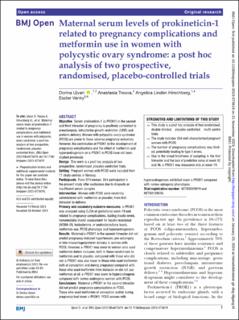| dc.contributor.author | Ujvari, Dorina | |
| dc.contributor.author | Trouva, Anastasia | |
| dc.contributor.author | Hirschberg, Angelica Lindén | |
| dc.contributor.author | Vanky, Eszter Ilona | |
| dc.date.accessioned | 2024-01-24T08:18:55Z | |
| dc.date.available | 2024-01-24T08:18:55Z | |
| dc.date.created | 2023-12-12T19:01:50Z | |
| dc.date.issued | 2023 | |
| dc.identifier.issn | 2044-6055 | |
| dc.identifier.uri | https://hdl.handle.net/11250/3113461 | |
| dc.description.abstract | Objective Serum prokineticin-1 (s-PROK1) in the second and third trimester of pregnancy is positively correlated to preeclampsia, intrauterine growth restriction (IUGR) and preterm delivery. Women with polycystic ovary syndrome (PCOS) are prone to these adverse pregnancy outcomes. However, the contribution of PROK1 to the development of pregnancy complications and the effect of metformin and hyperandrogenism on s-PROK1 in PCOS have not been studied previously.
Design This work is a post hoc analysis of two prospective, randomised, placebo-controlled trials.
Setting Pregnant women with PCOS were included from 11 study centres in Norway.
Participants From 313 women, 264 participated in the present study after exclusions due to dropouts or insufficient serum samples.
Intervention Women with PCOS were randomly administered with metformin or placebo, from first trimester to delivery.
Primary and secondary outcome measures s-PROK1 was analysed using ELISA at gestational week 19 and related to pregnancy complications, fasting insulin levels, homoeostatic model assessment for insulin resistance (HOMA-IR), testosterone, or androstenedione levels, metformin use, PCOS phenotype and hyperandrogenism.
Results Maternal s-PROK1 in the second trimester did not predict pregnancy-induced hypertension, pre-eclampsia or late miscarriage/preterm delivery in women with PCOS. However, s-PROK1 was lower in women who used metformin before inclusion, both in those randomised to metformin and to placebo, compared with those who did not. s-PROK1 was also lower in those who used metformin both at conception and during pregnancy compared with those who used metformin from inclusion or did not use metformin at all. s-PROK1 was lower in hyperandrogenic compared with normo-androgenic women with PCOS.
Conclusions Maternal s-PROK1 in the second trimester did not predict pregnancy complications in PCOS. Those who used metformin at conception and/or during pregnancy had lower s-PROK1. PCOS women with hyperandrogenism exhibited lower s-PROK1 compared with normo-adrogenic phenotypes. | en_US |
| dc.language.iso | eng | en_US |
| dc.publisher | BMJ Publishing Group Ltd. | en_US |
| dc.rights | Navngivelse 4.0 Internasjonal | * |
| dc.rights.uri | http://creativecommons.org/licenses/by/4.0/deed.no | * |
| dc.title | Maternal serum levels of prokineticin-1 related to pregnancy complications and metformin use in women with polycystic ovary syndrome: a post hoc analysis of two prospective, randomised, placebo-controlled trials | en_US |
| dc.title.alternative | Maternal serum levels of prokineticin-1 related to pregnancy complications and metformin use in women with polycystic ovary syndrome: a post hoc analysis of two prospective, randomised, placebo-controlled trials | en_US |
| dc.type | Peer reviewed | en_US |
| dc.type | Journal article | en_US |
| dc.description.version | publishedVersion | en_US |
| dc.source.volume | 13 | en_US |
| dc.source.journal | BMJ Open | en_US |
| dc.source.issue | 11 | en_US |
| dc.identifier.doi | 10.1136/bmjopen-2023-073619 | |
| dc.identifier.cristin | 2212633 | |
| cristin.ispublished | true | |
| cristin.fulltext | original | |
| cristin.qualitycode | 1 | |

